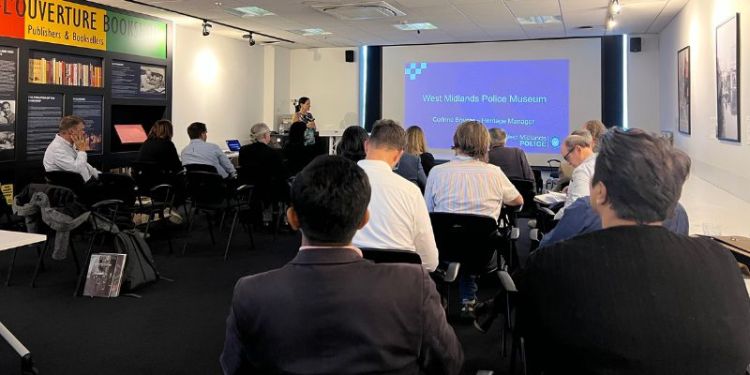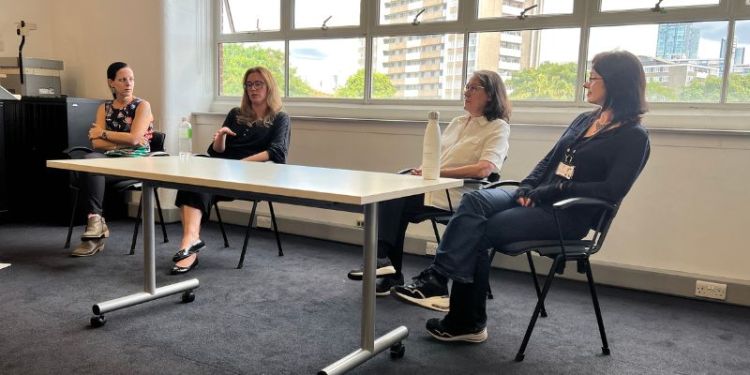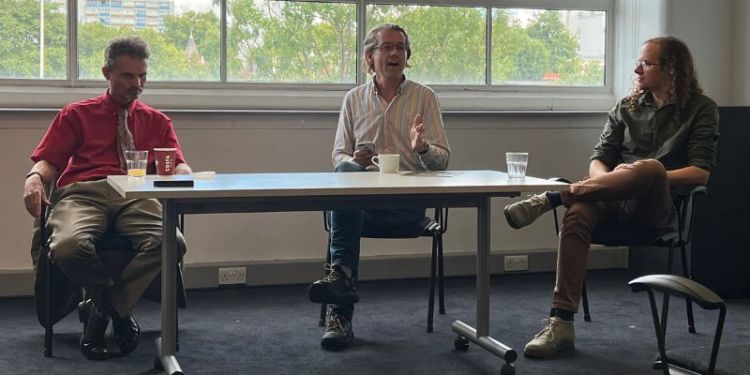Security Heritage Workshop: Making use of the past in the security sector
Centre for Criminal Justice Studies

How has the security industry developed over time? What traces of its history survive? What opportunities does engagement with this history offer security organisations today?
On 16 September 2022, David Churchill and Miranda Clow hosted a Security Heritage Workshop at the London Metropolitan Archives (LMA) to discuss these questions with leading figures in the security sector. Miranda reports on a stimulating and constructive day.
The security industry and heritage are not obvious bedfellows. Locks, alarms, grilles, cameras, computer anti-malware and private guards are familiar – often frustrating – features of everyday life. But we are attuned not to notice them.
Similarly, their past receives little notice. There are no major museums, no monuments, no pioneers that foreground the role that security commodities have played in facilitating modern life. Yet, it is difficult to conceive of the rise of large institutions and businesses in the nineteenth century without the development of safes and strong rooms to protect their paper records from fire. The protection of property, money, information and historic treasures are among the many other aspects of economic, social and cultural life that owe a debt to security expertise.
The public has forgotten security’s past; so too, perhaps, has the security industry itself. In a programme featuring speakers drawn from academic and practitioner contexts complemented by a display of archival material, the Security Heritage Workshop brought security’s past to life and considered how their shared history could serve security companies today.
The event sprang from a research project that David Churchill and I have been working on, focusing on security and the security industry in modern Britain. The workshop was well attended by representatives of major security companies and professional associations, including the British Security Industry Association and the International Professional Security Association.
The past
How old is the security industry? One could make an argument for a range of putative origins, from the ancient world to the postwar era.
In the opening presentation, David and I aimed to convince the audience that the industry has a past that stretches back at least two centuries, to new technical and commercial developments in the world of lock-making. The technological endeavours and the fierce competition between brands came as a surprise to the audience, as did the human stories of loss through crime and fire, and the implications of those losses for policing, the law and social practices.
Moreover, we showed that this history of the security industry can be examined from varied and colourful sources. The audience delighted in a display of highlights from security archives held by LMA, which allowed them to read letters, touch medals, and turn the pages of pamphlets. Their reaction to this past on display was immediate and rewarding. Attendees were impressed by the quantity of records that have survived and their visual appeal. Old adverts, documentation and photographs of products, people and tests aroused both pride and pleasure.
This historical material served as a starting point for attendees sharing their memories of their work in security. It also highlighted longstanding challenges faced by the security industry. A BBC Panorama film from 1963 showed how some issues faced by the industry today were equally evident sixty years ago. Industry leaders appreciated the insight provided by a long perspective.
The material on show also elicited debate about the industry’s reputation. Records from the Corps of Commissionaires archive revealed positive stories of guarding a century ago; stories like this could be used to connect with employees as well as with the public.
The present
Fresh from this survey of the past and its possibilities, we moved to the present where we heard from organisations that are already successfully harnessing history and heritage:
- Corinne Brazier (West Midlands Police Museum) highlighted the excellent work of the West Midlands Police Museum and police heritage more widely;
- Diz Sollesse (Corps Security) and Dorota Pomorska-Dawid (London Metropolitan Archives) spoke about their determined efforts to preserve the heritage of the oldest security guarding company in Britain;
- Alix Mortimer (Kings College London) presented the first fruits of research with the Lloyds Register Foundation, that matches today’s challenges in the shipping and engineering industries to those of the past.
The speakers were honest about the difficulties of persuading budget-holders to invest in heritage. But they could enumerate the benefits accrued from their persuasion – be it to school-children and local community, to a company’s cohesion and sense of identity, or to creative decision-making. A lens on the past was shown to widen the perspectives of all stakeholders in the organisation concerned. Here were models for how the security industry could make the most of its own history.

The future
Mark Rowe (Professional Security Magazine), Richard Wiltshire (Business Archives Council) and David Churchill ended the day with thoughts on future directions.
What would it take for the security industry to nurture its heritage systematically? First, a recognition that archives and heritage resources do not sustain themselves; they require attention and investment. If care is taken of them, they are an asset. It is up to security companies and industry bodies to take this initiative. From there, the industry can consider how to incorporate historical knowledge and material into its communications, training and other operations, with a view to underscoring the value of security and reinforcing internal and external relationships.
Looking to the future is a matter of preserving the present as well as the past. The industry would benefit from a project to preserve the memories of its current employees; in the near future these voices will represent the past. From their respective fields of journalism, archives and academia, the panel were united in offering to help the industry to make more of its significant heritage.
An old-fashioned padlock remains the totemic image of security. We hope this event has planted the seeds for the security industry to demonstrate its forward-looking character by a deep engagement with its heritage. Perhaps security’s past has been neglected because it contains uncomfortable truths. But the past might also offer a productive means of discussing recurrent issues.

Security professionals made an investment of their time by attending the workshop. Comments on the day, afterwards and on social media spoke to the value and inspiration which they took from it. I was thrilled to see how the project’s research could find an audience and at what I had learnt from those who spoke and attended.
Attendees took away a copy of a richly illustrated brochure on Security Heritage, produced by the project.
Thank you to the staff at the London Metropolitan Archives who made this event possible.

